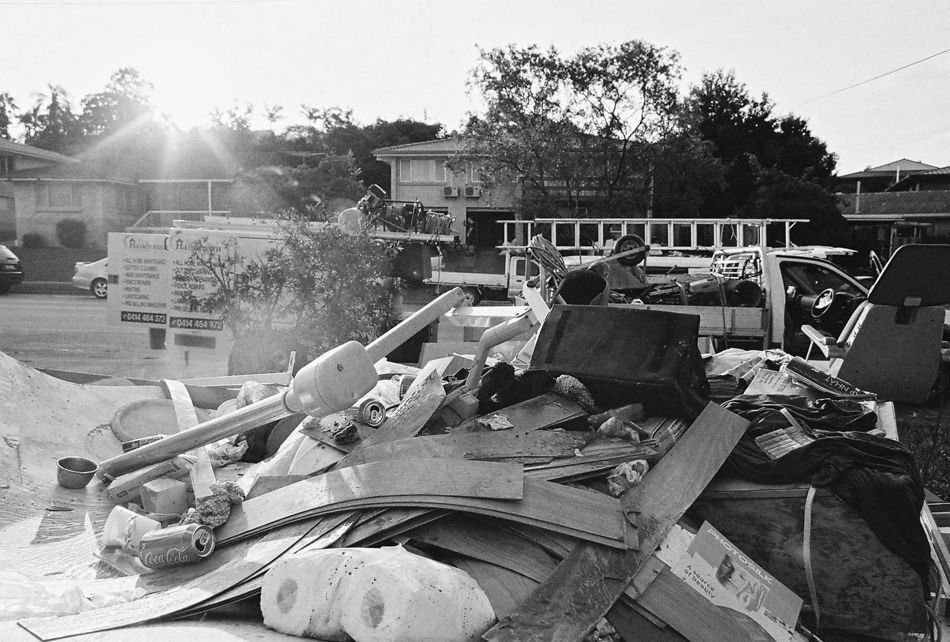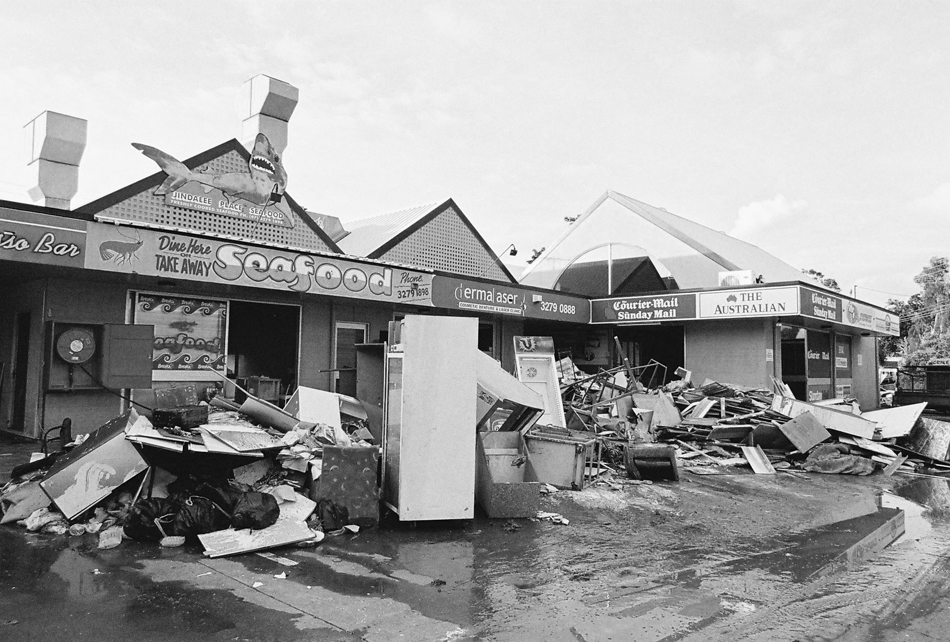
This image was captured from the top of Mt Ommaney, which is the suburb I live in. Looking down on the Brisbane River, running alongside the riverfront estate is Westlake. As the raging currents swept through Ipswich to Brisbane City, the river banks slowly gave in causing the water to inundate thousands of houses across the south-east. It’s a little hard to explain how unbelievably fat the river is here, it is normally about 1/3rd the size. I’m unsure if it’s visible on your screen but if you look closely at the bottom of the photo you may see brown water amongst the trees. If you look to your right you may notice a large home, it’s actually a multi-million dollar mansion which is located right on the river with a full size tennis court and an amazing swimming pool. Water flooded the home from both ways, the Brisbane River and the Mc Leod golf course.
I couldn’t of expected this photo to come out any better. 24mm, kodak iso400, f8.
Starting out as minor leaks caused by drains backing up on themselves suddenly turned into a river. Around about 09:00PM on Wednesday night, my brother, Rob and myself were monitoring the water levels from about 8 different locations. As we drove through Carragundi road, all of a sudden had a thin line of water running across the road, quite like it had just rained, nothing more than a millimetre or two spread across the bitumen. A couple of hours had passed so we thought we would go for another drive and check up on things around the area. Carragundi road was virtually inaccessible, with the raging waters raising in front of our eyes it wasn’t looking good for the local corner shops, let alone the houses surrounding it.
The aftermath; This… The shops were completely inundated with water. It isn’t very visible in these photos but the water level reached as high as the shark on the seafood shop sign. This photos were captured on Friday afternoon and I have to say it was quite an emotional walk through the area having people lost absolutely everything they own. More to come soon.
A simple definition of “accounting”
Accounting is how your business records, organizes, and understands its financial information.
You can think of accounting as a big machine that you put raw financial information into—records of all your business transactions, taxes, projections, etc.—that then spits out an easy to understand story about the financial state of your business.
Accounting tells you whether or not you’re making a profit, what your cash flow is, what the current value of your company’s assets and liabilities is, and which parts of your business are actually making money.
Accounting vs bookkeeping
Accounting and bookkeeping overlap in many ways. Some say bookkeeping is one aspect of accounting. But if you want to break them apart, you could say that bookkeeping is how you record and categorize your financial transactions, whereas accounting is putting that financial data to good use through analysis, strategy, and tax planning; If you are starting a small business make sure to get professional assistance and guidance from a small business accounting miami firm.
The accounting cycle
Accounting begins the moment you enter a business transaction—any activity or event that involves your business’s money—into your company’s ledger.
Recording business transactions this way is part of bookkeeping. And bookkeeping is the first step of what accountants call the “accounting cycle”: a process designed to take in raw financial information and spit out accurate and consistent financial reports.
The accounting cycle has six major steps:
- Analyze and record transactions (looking over invoices, bank statements, etc.)
- Post transactions to the ledger (according to the rules of double-entry accounting)
- Prepare an unadjusted trial balance (this involves listing all of your business’s accounts and figuring out their balances)
- Prepare adjusting entries at the end of the period
- Prepare an adjusted trial balance
- Prepare financial statements
Most of these rules and processes are automated by accounting software, so we’re going to skip over the gritty details of the accounting cycle and talk about the end product: financial statements.

